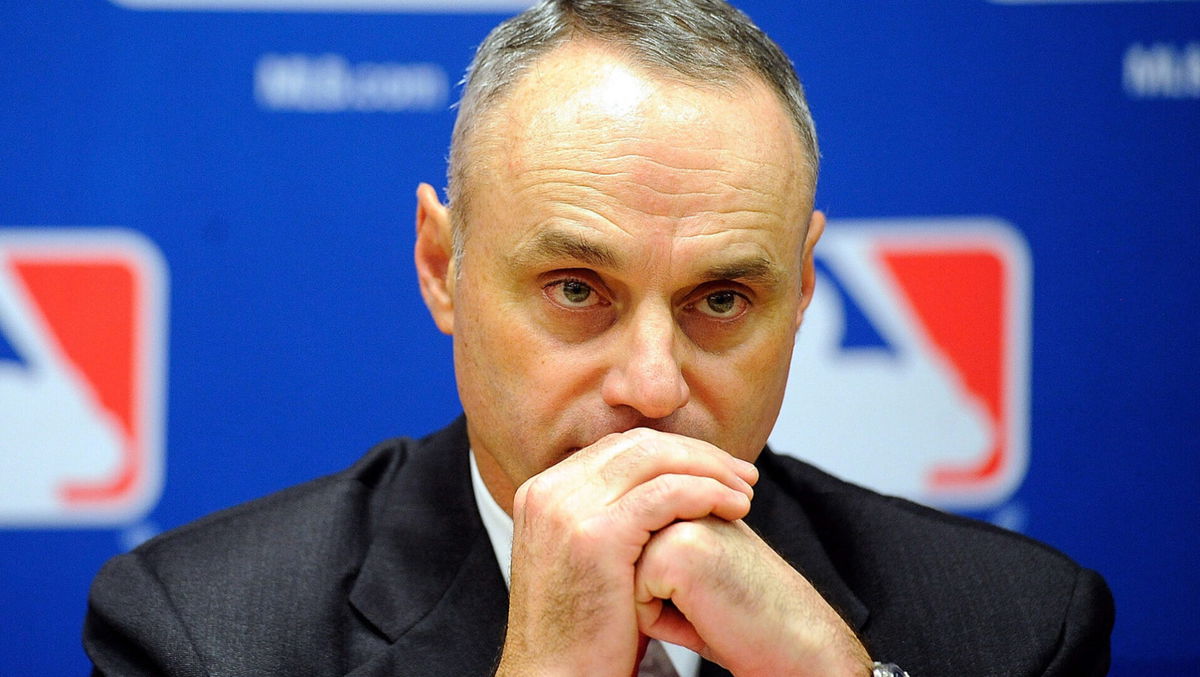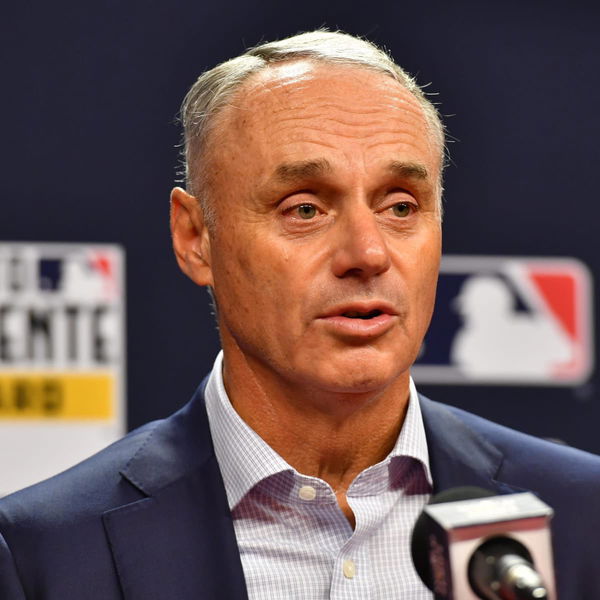
Getty
NEW YORK, NY – NOVEMBER 22: Major League Baseball Executive Vice President Rob Manfred speaks at a news conference at MLB headquarters on November 22, 2011 in New York City. Commissioner Bud Selig announced a new five-year labor agreement between Major League Baseball and the Major League Baseball Players Association. (Photo by Patrick McDermott/Getty Images)

Getty
NEW YORK, NY – NOVEMBER 22: Major League Baseball Executive Vice President Rob Manfred speaks at a news conference at MLB headquarters on November 22, 2011 in New York City. Commissioner Bud Selig announced a new five-year labor agreement between Major League Baseball and the Major League Baseball Players Association. (Photo by Patrick McDermott/Getty Images)
This off-season, there is one word on everyone’s lips, and no, it’s not Juan Soto, but the deferrals. The center of it, without a doubt, is the Los Angeles Dodgers. They have found a rather creative way to use the loophole in the current CBA agreement, which allowed MLB teams to defer payments of players as far into the future as they would like. The result? The Dodgers now owe over a billion dollars in deferred salaries for their players.
Watch What’s Trending Now!
The biggest slice of that deferred cake belongs to the Japanese star Shohei Ohtani. He signed a whopping $700 million deal last year, but Ohtani will take in around $68 million annually from 2034 to 2043, a crazy number that’s been pushed away. But why don’t other teams walk in their footsteps? Well, it’s more complicated than it’s on paper. MLB Commissioner Rob D. Manfred Jr. highlighted the risks recently, giving the example of the Arizona Diamondbacks and what transpired due to their excess deferrals.
Rob Manfred warns teams of excess deferrals
When it comes to deferred money, Rob Manfred knows his way around. With the LA Dodgers just racking up a billion dollars for payments in the future, Manfred isn’t thrilled. Rob mentioned that MLB has tightened the rules to ensure teams can fund deferred payments; he even cautioned: “The bigger the numbers get, the bigger the concern.” Manfred pointed to then Arizona, claiming, “Historically, we did have one franchise, Arizona, that got itself into financial difficulties as a result of excessive deferrals.” Back then, the co-owner was forced out of the franchise due to a financial mishap arising from deferrals.

Rob Manfred further noted, “Deferrals at some point can become problematic.” Well, history does say so; back in 2004, Jerry Colangelo, the then co-owner of the Arizona Diamondbacks, had racked up $254 million in deferred salaries, which later backfired poorly. Ticket prices soared, the team sank into bad financial chaos, and Colangelo was forced out—so yes, deferrals seem great but can bite back.
That said, the LA Dodgers could sure be playing with fire. Apart from Ohtani, they have Mookie Betts, with $115 million deferred into the 2040s, and Freddie Freeman has $57 million deferred. Additionally, Blake Snell, who only just signed for a $182 million deal, has $66 million deferred through 2046. So Manfred, by the Arizona Diamondback example, might be giving a gentle reminder that the bill will come.
Escrow accounts: A safety net to protect players and teams
When teams like the LA Dodgers pull up massive deferred salaries, there are risks. But MLB has a system in place to keep things in control, which is called escrow accounts! It is designed as a safety net, and these accounts ensure that even if the team faces financial difficulty or bankruptcy, the players still get paid. Rob Manfred mentioned, “That assures that the money is going to be there for the player to get paid. It doesn’t solve all of the ownership side issues in terms of, you know, if you go to sell the club, you’re selling a club with a big mortgage on its future.”

Well, when the teams exceed the CBT, which is the Competitive Balance Tax, they are bound to deposit a percentage of their payroll into the escrow account. This is to cover the penalties and obligations, and it also adds an umbrella of protection in uncertain times—like during a pandemic, when player salaries may be withheld temporarily to protect against revenue shortfalls. So, this is to ensure stability even if an economic downturn occurs, protecting both players and the teams.
The details of this strategy are listed in MLB’s CBA, which runs through December 2026. What do you think about the escrow accounts? Share with us below.






